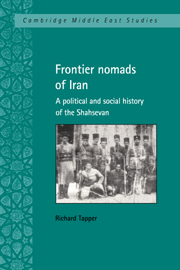Book contents
- Frontmatter
- Contents
- List of illustrations
- Preface
- Acknowledgments
- Note on transliteration
- Glossary
- 1 Writing tribal history
- PART I The Safavid state and the origins of the Shahsevan
- 2 ‘Shahsevani’: Safavid tribal policy and practice
- 3 Shahsevan traditions
- 4 Moghan and Ardabil in Safavid times
- PART II The rise of the Shahsevan confederacy
- PART III The Shahsevan tribes in the Great Game
- PART IV The end of the tribal confederacy
- Appendices
- Bibliography
- Index of topics
- Index of places, peoples, persons, dynasties, parties, companies
- Index of authors quoted or discussed
- Index of tribal names
- Plate section
3 - Shahsevan traditions
Published online by Cambridge University Press: 05 March 2012
- Frontmatter
- Contents
- List of illustrations
- Preface
- Acknowledgments
- Note on transliteration
- Glossary
- 1 Writing tribal history
- PART I The Safavid state and the origins of the Shahsevan
- 2 ‘Shahsevani’: Safavid tribal policy and practice
- 3 Shahsevan traditions
- 4 Moghan and Ardabil in Safavid times
- PART II The rise of the Shahsevan confederacy
- PART III The Shahsevan tribes in the Great Game
- PART IV The end of the tribal confederacy
- Appendices
- Bibliography
- Index of topics
- Index of places, peoples, persons, dynasties, parties, companies
- Index of authors quoted or discussed
- Index of tribal names
- Plate section
Summary
The ‘noble’ tribes: nineteenth-century traditions
Three versions of the traditions of the Shahsevan tribes of Ardabil were published in the late nineteenth century. The first was written by Col. I. A. Ogranovich in 1870, soon after his appointment as Russian frontier commissar for the Shahsevan at Belasovar. The second, published by the German naturalist Gustav Radde, who travelled in Talesh and among the Shahsevan on the slopes of Savalan in 1880, derives from a manuscript sent to him by Ogranovich in 1884. The third was published in 1890 by VI. Markov, Russian political agent, whose main source appears to be a report compiled in 1879 by E. Krebel, Russian consul-general in Tabriz at the time. Passages in Markov's account are identical with passages in Radde's, so we may assume that the manuscript which the latter was sent by Ogranovich was a copy of Krebel's report. All of the authors had firsthand acquaintance with the Shahsevan tribespeople, but to judge from their accounts none of them were familiar with any Persian sources, and their knowledge of Iranian history was rudimentary.
At this time the tribes were extremely turbulent, being notorious for their raiding activities across the Russian frontier, but they were still nominally within the control of two hereditary paramount chiefs, the elbeys.
- Type
- Chapter
- Information
- Frontier Nomads of IranA Political and Social History of the Shahsevan, pp. 58 - 71Publisher: Cambridge University PressPrint publication year: 1997



